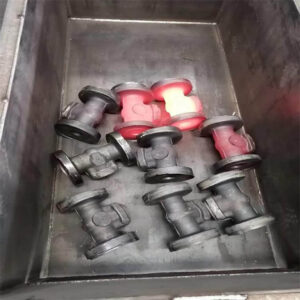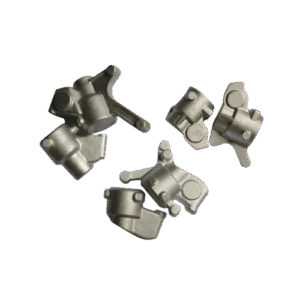Forged Valve Body
What is a Valve Body?
A valve body is the primary pressure boundary of a valve, acting as the main housing that contains the fluid or gas and directs its flow. It houses internal components like the trim (disc, seat, stem) and provides the connection points to the piping system. Essentially, the valve body is the core skeleton of the valve, responsible for withstanding system pressure, temperature, and corrosive media. Its integrity is paramount for the safety, efficiency, and reliability of the entire fluid control system.

Industries That Rely on Valve Bodies
Valve bodies are fundamental components across a wide range of industries where fluid control is critical. Key sectors include:
Oil & Gas: Upstream (wellheads, Christmas trees), midstream (pipelines, compressor stations), and downstream (refineries).
Power Generation: Nuclear, thermal, and hydroelectric power plants.
Chemical & Petrochemical: Handling aggressive and corrosive chemicals.
Water & Wastewater Treatment: Managing flow in treatment and distribution systems.
Marine & Shipbuilding: Used in ballast systems, fuel lines, and cooling systems.
Pharmaceuticals: Requiring high purity and corrosion resistance.
Benefits and Advantages of Forged Valve Bodies
Forged valve bodies are the premium choice for demanding applications due to their superior mechanical properties:
Superior Strength & Durability: The forging process aligns the metal’s grain structure, creating a continuous flow that results in exceptional tensile strength, fatigue resistance, and impact toughness.
Enhanced Structural Integrity: Forgings are free from the porosity, cavities, and shrinkage voids common in castings, leading to a more reliable and leak-proof component.
Better Resistance to High Pressure and Temperature: The dense, homogeneous structure of a forged body can withstand extreme pressures and temperature fluctuations without failing.
Increased Safety: The inherent reliability of forgings minimizes the risk of catastrophic failure, protecting personnel, equipment, and the environment.
Longer Service Life: Forged valve bodies offer greater longevity and reduced maintenance needs, even in the harshest operating conditions, providing a lower total cost of ownership.

Why Forging is Better Than Casting
While casting involves pouring molten metal into a mold, forging involves shaping solid metal using compressive forces. This fundamental difference gives forgings significant advantages:
| Feature | Forged Valve Body | Cast Valve Body |
|---|---|---|
| Internal Structure | Continuous, streamlined grain flow | Random, coarse crystalline structure |
| Density & Porosity | High density; virtually no porosity | Potential for porosity, shrinkage, and inclusions |
| Mechanical Strength | Higher strength, toughness, and impact resistance | Lower mechanical properties compared to forgings |
| Reliability | More consistent and predictable performance | Potential for hidden defects from the casting process |
| Suitability | Ideal for high-pressure, high-temperature, and critical service | Often used for less demanding applications or complex shapes |
The Manufacturing Process of a Forged Valve Body
The creation of a high-quality forged valve body follows a precise and controlled sequence:
Material Selection: High-grade raw materials (e.g., carbon steel, stainless steel, alloy steel) are selected based on the application requirements.
Heating: The material is heated to a specific forging temperature in a furnace to make it malleable.
Forging: The heated billet is shaped into a rough form (the “forging blank”) using a powerful press or hammer. This can be done through open-die or closed-die forging.
Heat Treatment: The forged blank undergoes thermal processes like normalizing, quenching, and tempering to achieve the desired mechanical properties (hardness, strength, toughness).
Rough Machining: Excess material is removed to create the basic shape of the valve body.
Non-Destructive Testing (NDT): Critical inspections like Ultrasonic Testing (UT) or Dye Penetrant Testing (PT) are conducted to ensure internal and surface integrity.
Finish Machining: The body is precision-machined to final dimensions, creating sealing surfaces, thread connections, and other critical features.
Surface Treatment & Coating: Applications like painting, plating, or special coatings are added for corrosion protection.
Final Inspection & Testing: Each valve body undergoes rigorous quality checks and may be pressure tested to ensure it meets all specifications.
Custom Forged Valve Body Solutions
We understand that every project has unique challenges. That’s why we specialize in providing fully customized forged valve bodies tailored to your exact needs. Our capabilities include:
Custom Materials: We work with a wide range of alloys to meet specific corrosion, temperature, and strength requirements.
Custom Designs & Dimensions: From unique port sizes to non-standard shapes, we can manufacture to your precise engineering drawings.
Application-Specific Engineering: Our technical team can collaborate with you to develop a valve body optimized for your specific pressure, temperature, and media conditions.
If you are looking for a reliable, high-performance, and custom-engineered forged valve body, contact us today. Let our expertise become the foundation of your most critical fluid control systems.
